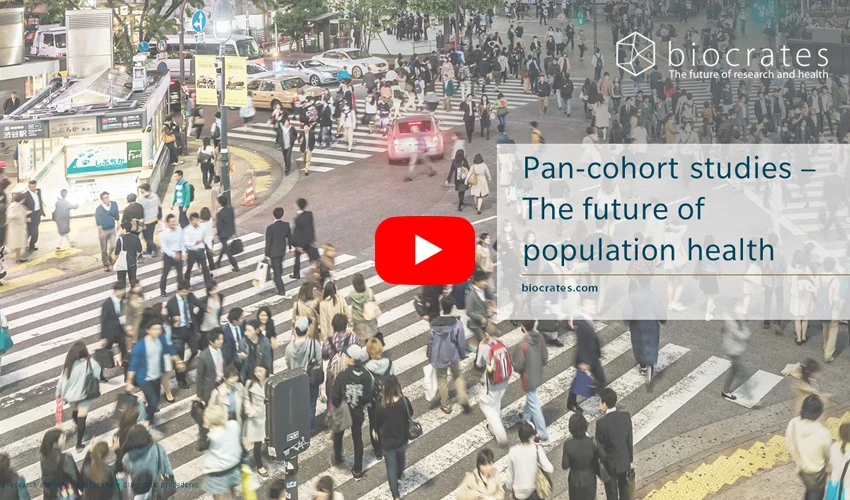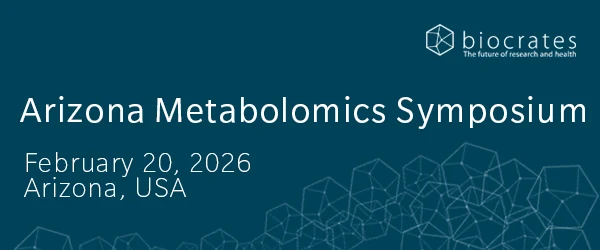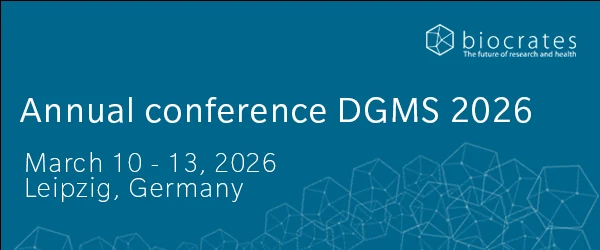Scientific presentations
Talks about the application of metabolomics
biocrates makes quantitative metabolomics accessible to scientists globally. Our customers and partners speak about the future of research and health in many different settings. Here we share some of their insights in different disease areas such as pharmacology, oncology, cardiovascular diseases, neurology, infectious diseases, or epidemiology.
Introduction to metabolomics in action
This lunch and learn event, sponsored by biocrates life sciences and hosted by Dr. Candace Guerrero, Assistant Director of the Center for Metabolomics and Proteomics at UMN, will feature presentations on cutting-edge research in metabolomics.
Investigating the stool and plasma metabolome of people with HIV
This lunch and learn event, sponsored by biocrates life sciences and hosted by Dr. Candace Guerrero, Assistant Director of the Center for Metabolomics and Proteomics at UMN, will feature presentations on cutting-edge research in metabolomics.
Metabolomics of sepsis and critical illness
This lunch and learn event, sponsored by biocrates life sciences and hosted by Dr. Candace Guerrero, Assistant Director of the Center for Metabolomics and Proteomics at UMN, will feature presentations on cutting-edge research in metabolomics.
Fast-tracking interpretation and sharing of lipidomic data with standardized methods
This talk will be especially aimed at scientists who are unsure how to analyze lipidomics and are looking for guidance.
Common pitfalls in clinical metabolomics: A guide from sample collection to data analysis
In this talk, I will highlight common pitfalls in the clinical metabolomics workflow and introduce useful tools to address these issues. This presentation is aimed at scientists involved in clinical projects who seek guidance on pre-analytical and dataset integration challenges.
Elucidating the impact of food-derived microbial metabolites on intestinal health
In my talk, I will present examples of applications of metabolomics in various sample matrices and how to use this powerful tool to study the effects of the microbiome on the host.
Metabolomics meets microbiome – Investigating host response with quantitative metabolomics
In my talk, I will present examples of applications of metabolomics in various sample matrices and how to use this powerful tool to study the effects of the microbiome on the host.
Developing a baseline metabolomic signature associated with COVID-19 severity: Insights from prospective trials encompassing 13 U.S. centers
This lunch and learn event, sponsored by biocrates life sciences and hosted by Dr. Candace Guerrero, Assistant Director of the Center for Metabolomics and Proteomics at UMN, will feature presentations on cutting-edge research in metabolomics.
Metabolomics in pharma – Bridging R&D translation barriers
In this lunch & learn event Marissa Jones shared insights on using metabolomics to uncover the “why” behind your research. Examine real-world case studies. and see biocrates technology in action. Learn how metabolomics is making an impact in the pharmaceutical industry.
Standardizing targeted metabolomics studies using Agilent 6495 LC/TQ in concert with biocrates
In this talk, I will discuss how biocrates solutions such as the MxP® Quant 500 XL kit fits seamlessly into the Agilent 6495 LC/TQ platform.
Standardized metabolomics kits for quantitative and reproducible results
In this talk, I will showcase how the MxP® Quant 500 XL kit and WebIDQ™ streamline targeted metabolomics for quantitative and reproducible results.
The new dogma of microbial bile acid metabolism
In my talk, I will present the new dogma of microbial bile acid metabolism.
Characterizing the metabolome in pediatric severe traumatic brain injury
In this talk, I will discuss the characterization of the metabolome in pediatric severe traumatic brain injury.
Metabolomic profiling of Cohort Consortium identifies prodromal biomarkers for Parkinson’s disease
In this talk, I will discuss how the comprehensive metabolomic profiling of the LRRK2 Cohort Consortium (LCC) identifies prodromal biomarkers for Parkinson’s disease.
Data interpretation tools to unleash the full impact of metabolomics
In this talk, I will discuss the highs and lows of data interpretation for metabolomists, and share the latest tools provided by biocrates to unleash the full impact of metabolomics for research and health.
Linking your research question to relevant metabolite features in untargeted metabolomics profiles
Metabolomics is vital for understanding biological processes but analyzing complex data is challenging. This talk covers advances in computational tools like FERMO and msFeaST, which streamline data analysis, linking phenotypes to metabolomic profiles.
Metabolomics meets microbiome | Quantify the impact in microbiome research
INSERT EXCERPT
Amino acid auxotrophies in the human gut microbiome
This talk presents a recent study that combined metabolomic, metagenomic, and metabolic modeling to assess the prevalence of bacterial auxotrophies in the human gut and their correlation with the host’s metabolome.
Gut metabolomic changes during pregnancy reveal the importance of GI region in sample collection
Gut regionality is key in physiology studies but often ignored in metabolome research. It’s crucial for understanding metabolic changes, especially during pregnancy.
The study of pre-diagnostic serum samples from the Norwegian Trøndelag Health Study (HUNT2 study) shows age-dependent differences linked to breast cancer risk
The study analyzed pre-diagnostic serum samples from healthy women in the Norwegian Trøndelag Health Study (HUNT2 study) to identify molecular biomarkers linked to breast cancer risk.
Metabolomics and application in colorectal cancer research
In this presentation Prof. Ose highlights the research conducted by an international consortium focusing on colorectal cancer (CRC) patients at the time of diagnosis.
Metabolomics in the Tohoku Medical Megabank and identification of biomarkers in gynecological cancer
Metabolomics, the comprehensive analysis of metabolites in vivo, has contributed significantly to research on the search for diagnostic biomarkers for various diseases.
Host-microbial interactions as pathophysiological nexus in inflammatory bowel disease
Immunometabolism is an important component to the pathophysiology of inflammatory bowel diseases and thus may serve the purpose of contributing to better and more personalized therapy decisions. While several metabolic pathways contribute, the talk puts special emphasis on the metabolism of the essential amino acid tryptophan.
Microbiota-derived 3-IAA influences chemotherapy efficacy in pancreatic cancer
Pancreatic ductal adenocarcinoma (PDAC) is expected to be the second most deadly cancer by 2040, owing to the high incidence of metastatic disease and limited responses to treatment. Less than half of all patients respond to the primary treatment for PDAC, chemotherapy, and genetic alterations alone cannot explain this. Using shotgun metagenomic sequencing and metabolomic screening, we show that the microbiota-derived tryptophan metabolite indole-3-acetic acid (3-IAA) is enriched in patients who respond to treatment.
Metabolomics as a tool to stratify patients and guide therapeutic decisions
Metabolomics can be used to develop tools to help guide therapy decisions in multiple ways, e.g. predict whether a drug will be effective, choose the best course of therapy, or monitor therapies along the patient journey.
Pan-cohort studies – The future of population health
With the second edition of this cohort event Pan-cohort studies – The future of population health- we are looking forward to expand into the physical spaces and stretch the scope beyond metabolomics.
WebIDQ the new evolution. Why the transition from MetIDQ?
During this webinar you can learn about WebIDQ, the next evolution of biocrates’ metabolomics workflow management and data processing software. With an intuitive user interface, WebIDQ guides users from sample registration through quantification and reporting.
Quantitative metabolomics database (QMDB)
During this webinar you can learn the benefits and possibilites of using the biocrates Quantitative metabolomics database (QMDB)
Short- and medium-chain fatty acids
During this webinar you can learn how microbiota impact the gut-immune axis through short- and medium-chain fatty acids
A metabolomics perspective on major depressive disorder
Depression has an impact on nitric oxide synthesis, urea cycle, inflammation, and ADMA levels. Metabolomics is a means to study depressive disorders and gives insights on disease etiology
Advancing cancer treatment by targeting dysregulated metabolism – A roadmap
Cancer cells adjust metabolic program to their specific energy needs in response to challenging microenvironment, which frequently results in cancer cell “addiction” to certain metabolic pathways. Those “addictions” could be deployed as treatment targets. Metabolic profiling by providing quantitative measure of metabolic processes offers attractive strategy for investigation of not only cancer cells “addictions” but also metabolic switches contributing to treatment resistance.
Targeted metabolomics in neurodegenerative diseases
You can learn how metabolomics can be applied to research in neurodegenerative diseases in a quantitative and reproducible manner.
Upcoming events
Arizona Metabolomics Symposium 2026
Join us at the Arizona Metabolomics Symposium 2026, an event exploring the latest developments in metabolomics research, its applications in health and metabolism, and fostering collaboration among scientists and the public. Attendees will hear from leading experts and ...
Annual conference DGMS 2026
The 57th Annual Conference of the DGMS, dedicated to the diversity and innovative potential of mass spectrometry across instrumentation, analytical strategies, and interdisciplinary applications, will bring together researchers, postdocs and experts for scientific talks...


































